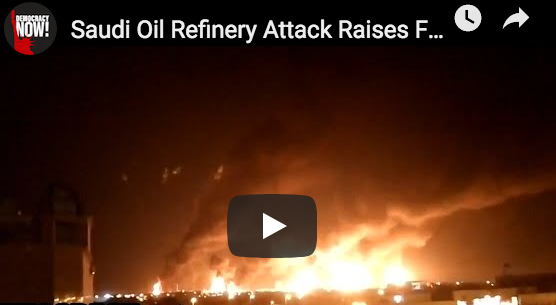Ann Arbor (Informed Comment) – You will note that in 2015-2018 we never heard anything about military tensions in the Gulf. During those years, the Joint Comprehensive Plan of Action (JCPOA) or Iran nuclear deal, was in effect and in January of 2016 all economic sanctions were lifted on Iran by the United Nations, the European Union, and, mostly, the United States.
There was a possibility that Iran would be drawn into the international community, with massive investment by European firms and an Iranian opening to the world market. With increasing amounts of investment money and trade at stake, Iran’s decision-makers would become less and less likely to rock the boat.
Iran has not had a military nuclear enrichment program since at least 2003, when a rudimentary set of experiments was rolled up after they became known. It has a civilian nuclear enrichment program, which aims to enrich to 3.5 to 5% for making fuel for nuclear reactors. The JCPOA aimed to prevent Iran from ever deciding to weaponize its civilian program, closing off all avenues to bomb production through limits on centrifuges, limits on enrichment levels, and through inspections and the disallowal of any heavy water reactors.
The UN inspectors repeatedly certified that Iran was in compliance with these restrictions. In response, Tehran was supposed to get sanctions relief. It didn’t.
On Friday, May 18, 2018, Trump abruptly pulled out of the JCPOA. Then he and his cabinet slapped the most severe sanctions on Iran ever imposed on a country in peacetime.
Trump went around the world threatening countries and their corporations, saying that if they bought Iranian oil or invested in Iran, they would be subject to massive fines and excluded from the $22 trillion a year American market. The US has developed a doctrine that it can control any trade conducted in dollars or on the international SWIFT banking exchange through the Treasury Department. So Shell can’t invest in Iranian natural gas if it wants to have Shell stations in the US or avoid billions in punitive fines.
Europe had hoped to keep the deal going, but none of its major corporations can afford to risk American third-party sanctions. It would be damaging to the JCPOA if only the US had withdrawn. But organized-crime-style third party sanctions meant that Trump was able essentially to dragoon the world into joining his “maximum pressure” or economic war on Iran.
Japan, under US pressure, stopped importing any Iranian oil last spring. So did South Korea. So, too, did India. Followed by Italy, Taiwan and Greece.
Iran’s exports of petroleum fell from 2.5 million barrels a day to, last May, 250,000 barrels a day or almost nothing.
Iran’s sale of its petroleum is perfectly legal in international law, and the rest of the members of the UN Security Council all voted to remove all such sanctions in 2015 (Obama joined in for the US at that time). Congress has not even voted on this economic war, despite that sort of thing being given to it by the US constitution, not the president. So it is just Trump and his cronies who declared and prosecuted this economic war and coerced everybody else into it.
Trump’s rationale for the economic war on Iran is that it is disruptive in the region. But Iran played a major role in defeating ISIL, which Washington is unable to bring itself to acknowledge. Iran has been a status quo power, propping up Iraq and Syria and keeping their governments in place. The disruptive powers in the region are Saudi Arabia and the United Arab Emirates, and Israel (which is colonizing the West Bank) and the United States itself. Israel and Saudi Arabia have exerted enormous pressure on Washington to pursue this economic war on Iran.
Because Iran depends heavily on oil income, the Iranian population as a whole has suffered massive downward mobility. The US hasn’t prevented medicine from going into Iran, but even middle class families just don’t have money to buy it. People’s health is suffering and some are dying. Middle class families are reduced to buying rotten produce.
This is a blockade. If Trump had drawn up warships off the coast of Iran and prevented it from exporting its oil or trading, that would be an acknowledged act of war in international law. But the economic war Trump launched on Iran acts as a blockade and so it seems to me takes on the character of an act of unprovoked aggression.
All this is not to mention US support for the Saudi-UAE war on Yemen. Although Iran is not deeply entangled in that largely local conflict, it does side with the Houthis, which the war aims at destroying– at the cost of some 80,000 Yemeni lives, millions displaced, ten million food insecure– a modern apocalypse.
Maximum pressure was supposed to make the Iranians fold. But there was always another possibility.
The tanker attacks and the Abqaiq and Khurais drone strikes we’ve seen in 2019 are regrettable and objectionable, but they are not surprising. They are a continuation by other means of the war that Iranians are already suffering from.
—–
Bonus video added by Informed Comment:




 © 2025 All Rights Reserved
© 2025 All Rights Reserved